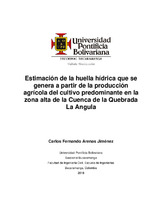Estimación de la huella hídrica que se genera a partir de la producción agrícola del cultivo predominante en la zona alta de la Cuenca de la Quebrada La Angula

View/
Date
2019-03xmlui.dri2xhtml.METS-1.0.item-advisor
Director. Correa Torres, Sandra Natalia
xmlui.dri2xhtml.METS-1.0.item-type
Tesis de Maestría
Citación
Metadata
Show full item recordDocuments PDF
Abstract
El presente estudio cuantifica la huella hídrica azul, verde y gris de las actividades agrícolas de los cultivos predominantes en la zona alta de la cuenca de la quebrada La Angula, en Lebrija, Santander. Así mismo se analiza la gestión del recurso hídrico utilizado en las actividades agrícolas. Para los años estudiados (húmedo y seco), el consumo total para la producción anual de piña y lima Tahití fue de 16.905.911,040 m3 teniendo en cuenta la huella hídrica azul, verde y gris. Del total de las huellas, el 74% corresponde a la producción de la lima Tahití con un gasto de 12.499.284,21 m3, y el 26%, corresponde a un volumen de consumo de 4.406.626,83 m3 para la producción de piña. Para la lima Tahití el rendimiento del cultivo fue de 21,8 ton/Ha, mientras que el de la piña fue de 44,6 ton/Ha; por su parte, la huella por tonelada fue de 486,15 m3/ton y 96.49 m3/ton respectivamente. Para analizar el cambio de huella hídrica según se presenten variaciones en los cultivos, se plantearon los escenarios Solo piña y solo Lima Tahití. Se evidencia que para el Escenario solo piña la huella total es menor, representando una disminución de cerca del 51.5% con 8.208.833,38 m3 respecto a los 16.905.911 m3 del año 2015, mientras que el Escenario solo lima Tahití significa un incremento de aproximadamente 37.4% con un volumen de 26.985.525,4 m3 en relación al año 2015. The present study quantifies the blue, green and gray water footprint of the agricultural activities of the predominant crops in the upper area of the basin of the La Angula stream, in Lebrija, Santander. Likewise, the management of the water resource used in agricultural activities is analyzed. For the years studied (wet and dry), the total consumption for the annual production of pineapple and Tahiti lime was 16,905,911,040 m3 taking into account the blue, green and gray water footprint. Of the total of the footprints, 74% corresponds to the production of the Tahiti file with an expenditure of 12,499,284.21 m3, and 26%, corresponds to a volume of consumption of 4,406,626.83 m3 for the production of pineapple. For the Tahiti lime, the yield of the crop was 21.8 tons / Ha, while that of the pineapple was 44.6 tons / Ha; On the other hand, the footprint per ton was 486.15 m3 / ton and 96.49 m3 / ton respectively. To analyze the change of water footprint according to variations in crops, the Only pineapple and only Lima Tahiti scenarios were considered. It is evident that for the Pineapple Scenario only the total footprint is lower, representing a decrease of about 51.5% with 8,208,833.38 m3 with respect to the 16,905,911 m3 of the year 2015, while the Scenario only lima Tahiti means an increase of approximately 37.4% with a volume of 26,985,525.4 m3 in relation to the year 2015.
Keyword/s
Producción agrícola
Huella hídrica
Agua virtual
Quebrada la angula
Collections
The following license files are associated with this item:

